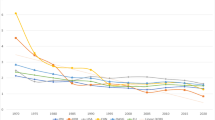Abstract
Prachi Srivastava argues that the seeming paradox of privatization within the context of Education for All is a result of the limited number of policy options that were legitimized by key policy actors of the movement, due to its internally contentious alliance. She identifies four ‘mobilizing frames’ that are strategically used to coalesce action around privatization: scarce resources, efficiency, competition-choice-quality, and social equity.
Similar content being viewed by others
Notes
The EFA FTI process is undergoing revision to the qualification process since fragile and lowest income countries were ineligible for the Catalytic Fund because of this and other criteria.
The World Bank experiment in Malawi in 1982–1983 that increasing fees would not result in decreased enrolments and that the poorest would not drop out because of excess demand (the Thobani Rule), led to plummeting enrolments. The subsequent elimination of school fees in 1994 led to a doubling of enrolments.
References
Apple, Michael W. (2001) Educating the ‘Right’ Way: Markets, standards, god, and inequality. New York: Routledge/Falmer.
Ball, Stephen J. (1998) ‘Big Policies/Small World: An introduction to international perspectives in education policy’, Comparative Education 34 (2): 119–130.
Benford, Robert D. and David A. Snow (2000) ‘Framing Processes and Social Movements: An overview and assessment’, Annual Review of Sociology 26: 611–639.
Camey, Stephen (2003) ‘Globalisation, Neo-liberalism and the Limitations of School Effectiveness Research in Developing Countries: The case of Nepal’, Globalisation, Societies and Education 1 (1): 87–101.
Cox, Donald and Emmanuel Jimenez (1990) ‘The Relative Effectiveness of Private and Public Schools: Evidence from two developing countries’, Journal of Development Economics 34 (1–2): 99–122.
Dakar Framework for Action (2000) ‘Education for All: Meeting our collective commitments’, Adopted by the World Education Forum, Dakar, Senegal, 26–28 April. Paris: UNESCO. http://unesdoc.unesco.org/images/0012/001211/121147e.pdf, accessed 15 June 2010.
Jimenez, Emmanuel, Marlaine E. Lockheed and Vicente Paqueo (1991) ‘The Relative Efficiency of Private and Public Schools in Developing Countries’, World Bank Research Observer 6 (2): 205–218.
Kingdon, Geeta (1996) ‘The Quality and Efficiency of Private and Public Education: A case study of urban India’, Oxford Bulletin of Economics and Statistics 58 (1): 57–82.
Lewin, Keith M. (2007) ‘The Limits to Growth of Non-government Private Schooling in Sub-Saharan Africa’, in Prachi Srivastava and Geoffrey Walford (eds.) Private Schooling in Less Economically Developed Countries: Asian and African perspectives, Oxford: Symposium Books.
Mehrotra, Santosh and Enrique Delamonica (2005) ‘The Private Sector and Privatization in Social Services: Is the Washington Consensus “dead”?’ Global Social Policy 5 (2): 141–174.
Mok, Ka-Ho (2005) ‘Globalisation and Governance: Educational policy instruments and regulatory arrangements’, International Review of Education 51 (4): 289–311.
Mundy, Karen (2006) ‘Education for All and the New Development Compact’, International Review of Education 52 (1): 23–48.
Mundy, Karen and Lynn Murphy (2001) ‘Transnational Advocacy, Global Civil Society? Emerging Evidence from the Field of Education’, Comparative Education Review 45 (1): 85–126.
Patrinos, Harry A., Felipe Barrera-Osorio and Juliana Guáqueta (2009) The Role and Impact of Public-Private Partnerships in Education, Washington, DC: World Bank.
Rose, Pauline (2003) ‘From the Washington to the Post-Washington Consensus: The influence of international agendas on education policy and practice in Malawi’, Globalisation, Societies and Education 1 (1): 67–86.
Snow, David A. and Robert D. Benford (1988) ‘Ideology, Frame Resonance, and Participant Mobilization’, in Bert Klandermans, Hanspeter Kriesi and Sidney Tarrow (eds.) International Social Movement Research: From structure to action. Comparing social movement research across cultures, Volume 1, pp 197–218, London: JAI Press.
Srivastava, Prachi (2008) ‘School Choice in India: Disadvantaged groups and low-fee private schools’, in Martin Forsey, Scott Davies and Geoffrey Walford (eds.) The Globalization of School Choice?, Oxford: Symposium Books.
Tooley, James and Pauline Dixon (2005) ‘An Inspector Calls: The regulation of “budget” private schools in Hyderabad, Andhra Pradesh, India’, International Journal of Educational Development 25: 269–285.
Tooley, James, Pauline Dixon, Yarim Shamsan and Ian Schagen (2010) ‘The Relative Quality and Cost-effectiveness of Private and Public Schools for Low-income Families: A case study in a developing country’, School Effectiveness and School Improvement 21 (2): 117–144.
UNESCO (2010) EFA Global Monitoring Report 2010: Reaching the marginalized, Paris: UNESCO.
Welch, Anthony R. (1998) ‘The Cult of Efficiency in Education: Comparative reflections on the reality and the rhetoric’, Comparative Education 34 (2): 157–175.
Wu, Kin Bing, Pete Goldschmidt, Christy Kim Boscardin and Deepa Shankar (2009) ‘International Benchmarking and Determinants of Mathematics Achievement in Two Indian States’, Education Economics 17 (3): 395–411.
Additional information
Identifies four ‘mobilizing frames’ that are strategically used to coalesce action around privatization in education
Rights and permissions
About this article
Cite this article
Srivastava, P. Privatization and Education for All: Unravelling the mobilizing frames. Development 53, 522–528 (2010). https://doi.org/10.1057/dev.2010.88
Published:
Issue Date:
DOI: https://doi.org/10.1057/dev.2010.88




